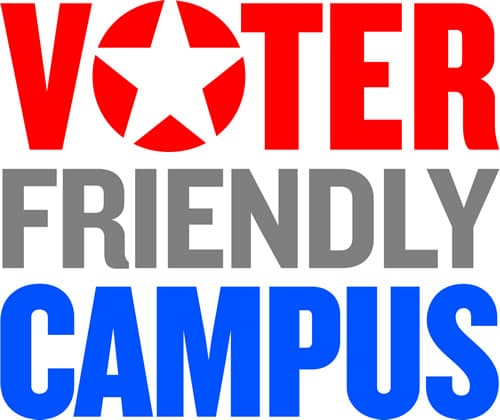
UNC Charlotte is one of 83 campuses in 23 states to be designated a “Voter Friendly Campus” by the nonpartisan organizations Campus Vote Project and NASPA – Student Affairs Administrators in Higher Education.
Institutions named “voter friendly” were selected for planning and implementing practices that encouraged their students to register and vote in 2016 general elections and in years to come.
Provost Joan Lorden, vice chancellor for academic affairs, stated, “UNC Charlotte has made a strong statement about the civic mission of higher education to prepare students to be engaged participants in our democracy and is excited to continue engaging students through 2017, 2018 and beyond.”
As part of the selection process, the University was evaluated on its plan to engage student voters. UNC Charlotte’s 49er Democracy Experience partnered with TurboVote, Campus Vote Project, the Andrew Goodman Foundation, the Mecklenburg County Board of Elections and the North Carolina State Board of Elections to develop a voter engagement strategy that focused on voter registration, voter education and voter mobilization. A team of 49er Democracy Experience student leaders and volunteers held voter registration drives, hosted debate watch parties, presented in classrooms and staffed information tables during early voting.
 The institutions designated Voter Friendly Campuses represent a wide range of two-year, four-year, public, private, rural and urban campuses with a total enrollment of nearly 1.4 million students. The designation is valid through December 2018.
The institutions designated Voter Friendly Campuses represent a wide range of two-year, four-year, public, private, rural and urban campuses with a total enrollment of nearly 1.4 million students. The designation is valid through December 2018.
NASPA is the leading association for the advancement, health and sustainability of the student affairs profession.
The Fair Elections Legal Network is a national, nonpartisan election reform organization working to remove barriers to registration and voting for traditionally underrepresented constituencies and improve election administration. The network’s Campus Vote Project (CVP) works with universities, community colleges, faculty, students and election officials to reduce barriers to student voting and helps campuses institutionalize reforms that empower students with the information they need to register and vote.